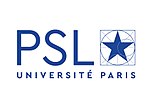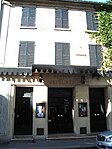Institut océanographique de Paris
1906 establishments in FranceBuildings and structures in the 5th arrondissement of ParisEducational institutions established in 1906Monuments historiques of ParisOceanographic organizations

The Institut océanographique de Paris (English: Oceanographic Institute of Paris), is an oceanographic institution founded in 1906 by Albert I, Prince of Monaco, which also includes the Oceanographic Museum of Monaco. The building was designated as a Monument historique in 2004. In 2011, for the 100 year anniversary, it was renamed the Maison des océans.
Excerpt from the Wikipedia article Institut océanographique de Paris (License: CC BY-SA 3.0, Authors, Images).Institut océanographique de Paris
Rue d'Ulm, Paris 5th Arrondissement (Paris)
Geographical coordinates (GPS) Address Website Nearby Places Show on map
Geographical coordinates (GPS)
| Latitude | Longitude |
|---|---|
| N 48.844444444444 ° | E 2.3422222222222 ° |
Address
Université PSL - Quartier latin
Rue d'Ulm 46
75005 Paris, 5th Arrondissement (Paris)
Ile-de-France, France
Open on Google Maps






